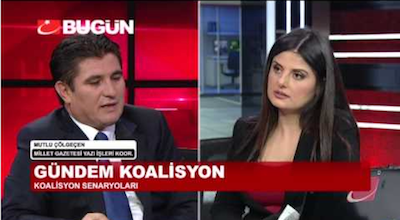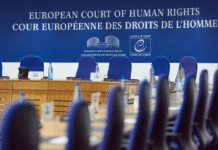A prominent journalist known for his scoops on defence and military affairs has been jailed in Turkey for 432 days over Tweet messages and is facing up to 15 years jail sentence if he gets convicted.
Mutlu Çölgeçen, 46-year-old journalist, stands accused of terrorism and coup plotting charges by the public prosecutor who presented over 35 Tweet messages and two news articles critical of the government as evidence of terror and violence.

During the interrogation, the journalist was asked why he posted a comment on Tweet saying that Turkey’s hushed-up corruption investigations that incriminated Turkey’s autocratic President Recep Tayyip Erdoğan’s inner circle in 2013 would be reopened one day. Çölgeçen responded by saying that this was a claim raised by ultra-nationalist Homeland Party Chairman Doğu Perinçek who has notable influence in the Turkish judiciary and the Turkish military, and now collaborates closely with Erdoğan in order to purge critical civil servants from state institutions.
Indictment penned by public prosecutor Murat Çağlak also presented two news articles written by the journalist on landmark Ergenekon and Sledgehammer cases — where a renegade ultra-nationalist group that is nested in Turkish military and the state tried to wreak havoc in Turkey by plotting murders, terrorism acts and coups — as terrorism evidence. Interestingly enough, these articles were published by Sabah and Yeni Asır newspapers that are owned by Erdoğan’s family.
Prosecutor deliberately ignored Çölgeçen’s Tweet messages in which he said staunchly opposed to putschists and supported the elected government during the abortive coup attempt on July 15, 2016. The Turkish Code of Criminal Procedures (CMUK) require prosecutors to compile evidences that may benefit defendants in criminal cases.
When Çölgeçen appeared before the panel of judges for the first time on March 27, 2017, he was surprised to see that the presiding judge is the same judge who arrested him during the arraignment hearing. Turkish judicial regulations forbid investigating judges to sit at the benches during the trial hearings.
The journalist made a joke by saying that “I am glad to see you once again your Honour. You had not spared enough time for me during the arraignment hearing. I would be happy to defend myself now in a larger period of time.” As expected, Çölgeçen rejected all accusations brought against him and said that he did not agree to the government’s narrative on failed coup attempt and underlined individual criminal responsibility as opposed to the collective punishment.
After 5 day hearings, the court ruled for the continuation of his arrest pending trial hearings.
Çölgeçen later appeared at three successive hearings on April 27, July 6 and October 24 in 2017. He once again rejected allegations of being a member of terror organization and emphasized what he had done was a journalism. He demanded his release in order to continue his profession as an investigative journalist.
Judges rejected all his motions to get released. His next hearing will be held on December 4, 2017, one and half year incarceration in pre-trial detention.
Çölgeçen was born in 1971 in Denizli, a western city in Turkey. He studied literature at İstanbul University. He started his journalism career in 1994 at Kanal 6 which was a popular TV network at the time. He had worked at various media outlets owned by different media groups including Kanaltürk TV and dailies Yeni Şafak, Akşam, Takvim and Sabah.

Çölgeçen who authored three books, was a frequent guest as commentator on news programs for networks, talking mostly about military and security affairs that he has covered for years.
He is married with two daughters.
Turkey is the biggest jailer of journalists in the world. The most recent figures documented by the SCF has showed that 256 journalists and media workers are in jails as of November 7, 2017, most in pre-trial detention languishing in notorious Turkish prisons without even a conviction. Of those in Turkish prisons, 231 are arrested pending trial, only 25 journalists remain convicted and serving time in Turkish prisons. An outstanding detention warrants remain for 135 journalists who live in exile or remain at large in Turkey.
Detaining tens of thousands of people over alleged links to the Gülen movement, the government also closed down more than 180 media outlets after the controversial coup attempt.
Turkey survived a controversial military coup attempt on July 15, 2016 that killed 249 people. Immediately after the putsch, the Justice and Development Party (AKP) government along with President Erdoğan pinned the blame on the Gülen movement.
Gülen, who inspired the movement, strongly denied having any role in the failed coup and called for an international investigation into it, but President Erdoğan — calling the coup attempt “a gift from God” — and the government initiated a widespread purge aimed at cleansing sympathizers of the movement from within state institutions, dehumanizing its popular figures and putting them in custody.
Turkey has suspended or dismissed more than 150,000 judges, teachers, police and civil servants since July 15. Turkey’s Justice Ministry announced on July 13 that 50,510 people have been arrested and 169,013 have been the subject of legal proceedings on coup charges since the failed coup.















